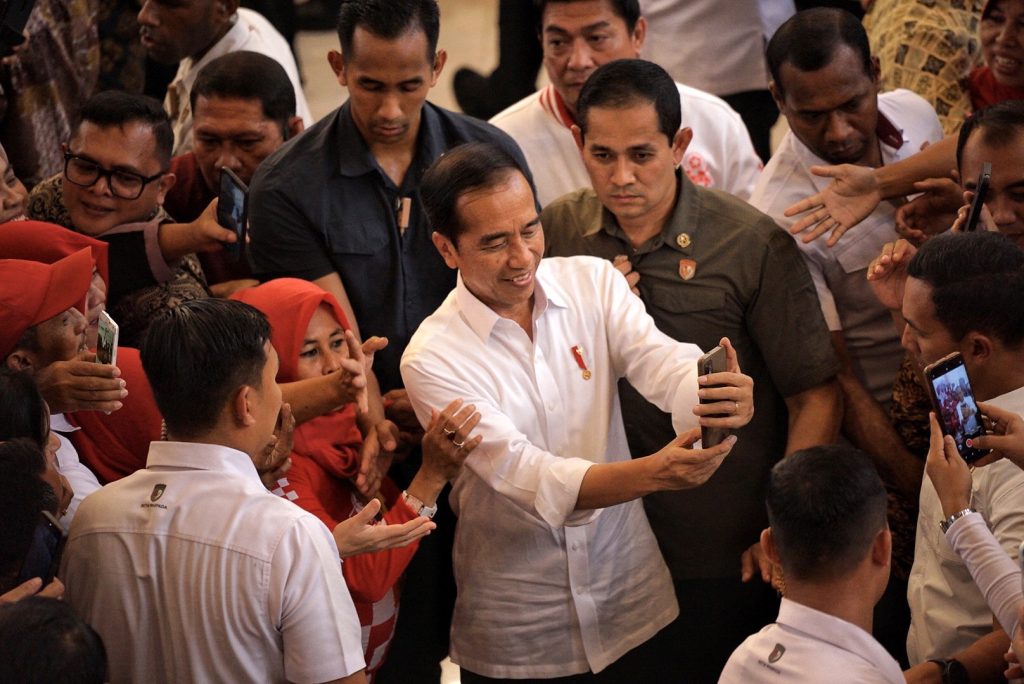Much like a soap opera, Indonesian politics in 2023 was full of plot twists. With less than a year until the presidential and legislative elections scheduled for February 2024, political parties and elites engaged in unpredictable manoeuvres and established new configurations of political power.
2023 was the year of President Joko ‘Jokowi’ Widodo, who has completely transformed from a mere party official into one of Indonesia’s most powerful kingmakers. Indonesian politics is the politics of elites, and this feature will persist throughout 2024.
Two major plot twists occurred in 2023.
The first unfolded when Muhaimin Iskandar, chair of the National Awakening Party (PKB), unexpectedly left the coalition supporting Defence Minister Prabowo Subianto’s presidential candidacy. Muhaimin and PKB joined the coalition of mostly opposition parties endorsing former Jakarta governor Anies Baswedan, with Muhaimin taking on the role of Anies’ vice presidential candidate.
This move stirred dissatisfaction within former president Susilo Bambang Yudhoyono’s Democratic Party, an original pro-Anies coalition member. They had initially hoped that their chairman, former first son Agus Harimurti Yudhoyono, would be the vice presidential candidate. In response, the Democratic Party withdrew from the coalition and joined the political bloc supporting Prabowo’s presidential bid.
The second twist involved the appointment of Gibran Rakabuming Raka, President Jokowi’s eldest son, as Prabowo’s vice presidential candidate following a controversial Constitutional Court decision that allowed individuals under 40 with prior experience as an elected official to run in presidential elections.
Gibran’s nomination as Prabowo’s vice presidential candidate would have once been unimaginable, because Prabowo was Jokowi’s main opponent in the 2014 and 2019 presidential elections. This move strained the relationship between Jokowi and the Indonesian Democratic Party of Struggle (PDI-P). PDI-P was the main political party backing Jokowi during his 2014 and 2019 presidential bids.
Jokowi and the PDI-P initially nominated Ganjar Pranowo, the former governor of Central Java, as a presidential candidate. Now it is clear that the president no longer supports Ganjar and backs the Prabowo–Gibran ticket instead.
Elites’ electoral interests were the main driver of 2023’s two major plot twists. Public participation and ideological considerations were minimal if not non-existent. The emergence of three axes of power in the upcoming presidential election resulted from political elite bargaining, leaving the public to watch from afar.
The candidates’ lack of clear ideological distinctions presents a political dilemma. The Prabowo–Gibran and Ganjar–Mahfud tickets are both striving to portray themselves as Jokowi’s successors. The Anies–Muhaimin duo has taken a different stance by criticising Jokowi’s policies. But they still appear hesitant to position themselves as completely opposed to Jokowi. Their stance on the development of the new Indonesian capital city in East Kalimantan, for example, remains ambiguous.
The lack of ideological differences has also led to political gimmicks where a candidate’s image and behaviour receive more attention than substantive issues. Prabowo’s campaign team has attempted to portray Prabowo as a cute, chubby figure by using avatars and social media content that shows Prabowo dancing. This gimmick is designed to soften Prabowo’s temperamental image and shift attention away from human rights activists’ criticism regarding his involvement in activist kidnappings in 1998.
Similarly, Anies Baswedan has used TikTok Live to answer supporters’ mundane questions, such as providing tips for completing their bachelor’s thesis or giving motivational advice. None of these gimmicks encourage programmatic debates or offer public political education.
On the other hand, the absence of strong ideological divisions between the axes could facilitate an easier and more peaceful post-election reconciliation. Polarisation between different camps of supporters will not be as severe as during the 2019 presidential election.
While there is the possibility that one of the candidates may once again flirt with conservative Islamists, there is no strong sign that any of the candidates will seriously engage in identity politics. A return to business as usual is expected post-election, with a cartelised political party system resulting in large governing coalitions emerging from elite bargaining.
Notably, much of the political dynamics in the lead up to the 2024 presidential election are inextricably linked to Jokowi, who has evolved into a new centre of gravity in the Indonesian political landscape. As the only president to achieve an approval rating exceeding 80 per cent since the 1998 Reformasi, Jokowi’s political manoeuvres have shaped every step his supporters and opponents take.
Jokowi does not lead a political party, but he has a large network of volunteers and supporters willing to follow him wherever he points his finger. As president, he also has the power to control and deploy state resources to accomplish political outcomes that benefit him, including retaining ministers from political parties that oppose the Prabowo–Gibran ticket.
President Jokowi’s position as a kingmaker has the potential to significantly impact political outcomes in 2024. None of the candidates, according to opinion polls, have passed the 50 per cent threshold required to win the election in a single round, even though the Prabowo–Gibran pair has consistently been in first place.
The urgency for the Prabowo–Gibran ticket to win the election in one round has slowly revealed Jokowi’s true colours. The President’s partisanship has become clearer in recent weeks. He made presidential visits to key battleground areas, issued populist policies and made a controversial declaration about his right as president to campaign for one of his preferred candidates while standing next to Prabowo.
The electoral effects of Jokowi’s support for Prabowo and his son’s candidacy may determine whether the presidential election will be held in one or two rounds. If this happens, Indonesia’s democracy will be on the brink of becoming a competitive authoritarian regime.
Yoes C Kenawas is a Research Fellow at the Institute for Advanced Research, Atma Jaya Catholic University.

